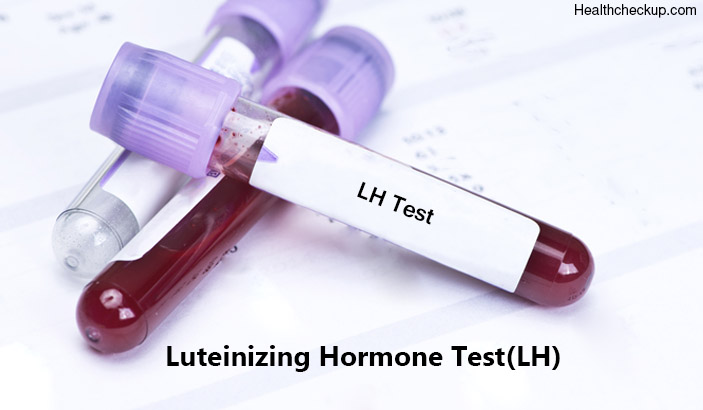The luteinizing hormone(LH) test is a blood test performed to measure the levels of the luteinizing hormone in the blood.The luteinizing hormone is an important hormone that is produced by the pituitary gland, a pea-sized gland, located at the base of the brain. The luteinizing hormone is essential for the health of the reproductive systems of both men and women, and it acts on the testes and the ovaries respectively. The pituitary gland also produces other hormones such as the Follicle Stimulating Hormone (FSH), the Thyroid Stimulating Hormone (TSH), and the Human Chorionic Gonadotropin (HCG) along with the luteinizing hormone.
The luteinizing hormone test is usually accompanied by a test to measure the FSH levels in blood, because both these hormones are essential for the reproductive system, and a deep analysis of the patient’s symptoms, his/her general health, and the hormonal profile will help a doctor understand the real problem causing abnormality in the LH levels, and, thus, determine the right line of treatment.
Luteinizing Hormone(LH) Test Function
As mentioned earlier, the luteinizing hormone is an important hormone that controls the reproductive systems in both men and women. It has different roles in the bodies of men and women but is crucial to the health of the reproductive system in both the sexes. It is called a Gonadotropin Hormone because it acts on the gonads, i.e. the testes and the ovaries in men and women respectively.
In females, the luteinizing hormone plays an important role in the menstrual cycle, and it works along with the Follicle Stimulating Hormone (FSH) which is also a gonadotropin. The FSH acts to stimulate the ovarian follicle to produce an egg and also triggers the production of the hormone estrogen in the follicle.
The rise in the estrogen levels causes the pituitary gland to stop producing the FSH and start producing the luteinizing hormone. The rise in LH levels causes the egg to be released from the ovary in a process called Ovulation. Once the egg is released, cells proliferate in the empty ovarian follicle and turn it into corpus luteum. The corpus luteum then releases the hormone progesterone that helps in maintaining pregnancy, if it occurs. If no pregnancy occurs during this time, then there will be a drop in the progesterone hormone levels, and another menstrual cycle begins in the woman’s body.
In men, the LH released by the pituitary gland binds to the receptors in cells called the Leydig Cells present in the testes and stimulates the release of the hormone testosterone which is essential to produce the sperm cells, the male reproductive cells.
What is the LH Test?
As mentioned earlier, the luteinizing hormone(LH) test is blood test performed to check the levels of the luteinizing hormone in your bloodstream during different times of your menstrual cycle if you’re a woman. This is because the hormone levels vary during different times of the menstrual cycle. If you’re undergoing tests for fertility, the luteinizing hormone(LH) test may be conducted several times during your menstrual cycle to observe the rise and fall in the hormonal levels during different times of the cycle.
The LH test may be used to determine the exact time when ovulation takes place, and help you plan the right time for intercourse if you want to be pregnant. In patients who face a problem becoming pregnant, the luteinizing hormone(LH) test will help to find out if a woman is ovulating, and if not, it will help the doctor decide if the cause is a primary failure of the ovaries, i.e. if the ovaries are failing in their normal function or if the cause is secondary failure, i.e. if the failure of the ovaries is being caused by problems related to the pituitary gland or the hypothalamus.
The LH test is also done for women facing menstrual irregularities such as not having periods or irregular menstrual cycle. The test will also help determine if a woman is going through menopause if she is aged above 40 years.
The luteinizing hormone test is usually conducted midway through a woman’s menstrual cycle, i.e. the 14th day of a 28-day cycle. This is because there is a surge in the LH levels during this time that triggers ovulation.
In men, the luteinizing hormone test is usually conducted to check the standard levels of the hormone in the blood, especially to find the cause of infertility. Sometimes, the LH levels are checked after injecting the Gonadotropin Releasing Hormone (GnRH) to diagnose if the problem with the pituitary gland is causing low levels of LH in the body or if there is any other cause to it.
The LH test is mostly done in conjunction with other hormone tests such as FSH, estradiol, testosterone, and progesterone to determine the exact cause of infertility and to help plan the right line of treatment.
LH Test Preparation
The luteinizing hormone(LH) test is a simple blood test, but it is advisable to get clear directions from your doctor before undergoing the test to avoid any inaccuracies in the test results.
If you’re a woman and are taking birth control pills or any hormonal supplements, the doctor will advise you to stop these medications about 4 weeks prior to undergoing the test.
In general, most doctors advise patients to avoid eating or drinking anything for eight hours prior to the test, and you should inform the doctor if you have undergone any test or procedure involving a radioactive substance about 7 days prior to undergoing the LH test, as these substances can interfere with the test results.
LH Test Procedure
Since the luteinizing hormone(LH) test is a blood test, a blood sample will be collected for the test in a lab. The healthcare worker collecting the blood sample will first tie an elastic band around the upper part of your arm, and then clean the inside of your elbow with alcohol. The blood sample is usually collected from a vein in your arm. So, to collect the sample, the healthcare worker will insert a needle into a vein, and collect the blood sample in a vial.
Once the vial is full and enough blood sample has been collected, the needle is removed, along with the elastic band tied to the upper arm, and a bandage is placed over the needle puncture site.
As mentioned before, the LH test might be conducted a number of times during a woman’s menstrual cycle to measure the LH levels at different times during the cycle.
LH Test Results And Normal Range
For women, the LH levels can vary at different times of the menstrual cycle, and the normal values measured in international units per liter, i.e. IU/L are as follows
- At the follicular phase of the menstrual cycle: 1.9 to 12.5 IU/L
- At the peak of the menstrual cycle: 8.7 to 76.3 IU/L
- During the luteal phase of the menstrual cycle: 0.5 to 16.9 IU/L
If a woman is pregnant, an LH value less than 1.5 IU/L is considered normal.
For women in the postmenopausal age, an LH value ranging between 15.9 to 54.0 IU/L is considered normal.
The normal value for the luteinizing hormone test is considered to be between 0.7 to 5.6 IU/L for women taking contraceptive pills.
For Men, the Normal LH values Usually Vary with Age and are as Follows:
- For men aged between 20 and 70, the normal value is 0.7 to 7.9 IU/L
- For men above the age of 70, the normal value is 3.1 to 34.0 IU/L
Frequently Asked Questions (FAQs)
What is a Normal LH Level?
The normal values for a luteinizing hormone(LH) test vary depending on an individual’s unique condition and factors such as age, sex, and the consumption of certain medications such as contraceptive pills and hormonal supplements. The normal LH values are mentioned above based on the different factors.
Why is My Luteinizing Hormone Low?
For women, increased levels of luteinizing hormone in the blood usually indicate a problem involving the ovaries, commonly known as a primary ovarian failure. The causes of primary ovarian failure include
- Underdeveloped ovaries
- Congenital conditions such as Turner syndrome or Klinefelter syndrome which affect the production of hormones
- Exposure to radiation
- Polycystic Ovary Syndrome (PCOS)
- Consumption of chemotherapy drugs
- Tumor in the ovaries
- Diseases affecting the thyroid or adrenal glands
Low levels of the luteinizing hormone indicate secondary ovarian failure, i.e. ovarian failure caused by a disorder affecting other parts of the body, especially the pituitary gland, where the luteinizing hormone is produced.
For men, Increased Levels of Luteinizing hormone in the Blood Indicate Primary Testicular Failure, Whose Causes may be:
- Chromosomal abnormalities caused by disorders such as the Klinefelter Syndrome
- Underdevelopment of the testes
- A history of severe viral infections such as mumps
- Exposure to radiation
- Consumption of chemotherapy drugs
- Testicular cancer, also known as Germ Cell Tumor
As in women, low levels of LH may be caused in men due to the disease of the hypothalamus or the pituitary gland. This usually leads to low testosterone levels, and the men with this condition may experience sexual dysfunction, lack of sexual drive, and fatigue.
In children, High Levels of LH Causes early Attainment of Puberty, Commonly known as Precocious Puberty. The Common Causes for this Condition Include:
- Any tumor in the central nervous system
- Trauma or injury to the brain
- Infection and inflammation present in the central nervous system such as meningitis or encephalitis
- Any history of brain surgery
- History of exposure of the brain to harmful radiation
Girls are more likely to experience precocious puberty as compared to boys of the same age. Lower than normal LH levels usually delay puberty in boys and girls.
What Should your LH Level be to Ovulate?
There is a surge in the levels of the LH about 24 to 36 hours prior to ovulation. This is necessary to trigger ovulation. A luteinizing hormone test value of 0.5 to 16.9 IU/L is considered ideal to allow ovulation to take place.
Medically Reviewed By

I am an experienced Medical/Scientific writer with a passion for helping people live a happy healthy life. My thirst for writing has followed me throughout the years – it is there when I wake up, lingering at the edges of my consciousness during the day, and teases me at night as I go to sleep.








